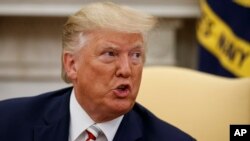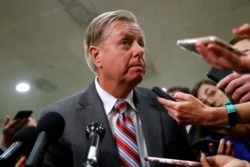The White House on Thursday abandoned its fight with Congress over whether to fund $4 billion in foreign aid and will allow the money to be spent.
U.S. President Donald Trump had considered cutting the spending on the ground that it was wasteful and unnecessary, but he retreated when it became apparent that some key lawmakers were opposed.
"The president has been clear that there is waste and abuse in our foreign assistance, and we need to be wise about where U.S. money is going," a senior White House official told VOA, "which is why he asked his administration to look into options to doing just that."
But after both Republican and Democratic lawmakers objected to the White House effort to freeze the foreign aid already approved by Congress, the Trump administration gave in.
"It's clear that there are many [in Congress] who aren't willing to join in curbing wasteful spending," the White House official said.
Some of Trump's top budget-cutters wanted him to trim the foreign aid as a show of fiscal restraint after Trump recently signed a two-year, $2.7 trillion spending plan.
But House Speaker Nancy Pelosi of California, who oversees the Democratic-controlled House of Representatives, said that withholding the money would have violated "the good faith" of reaching agreement on the long-term budget.
Two Republicans, Senator Lindsey Graham of South Carolina and Representative Hal Rogers of Kentucky, said freezing the foreign aid spending would hurt "significant" national security and counterterrorism efforts while also complicating spending negotiations between the White House and Congress in the future.
Trump had expressed some ambivalence about the funding.
"We give billions and billions of dollars to countries that don't like us — don't like us even a little bit," the president told reporters last weekend. "And I've been cutting that. And we just put a package of about 4 billion additional dollars in. And in some cases, you know, in some cases, I could see it both ways. In some cases, these are countries that we should not be giving to."






